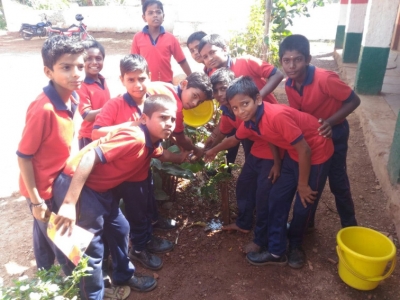
About one-third of the world’s population suffer from one or more deficiency of micro-nutrient. In India food insecurity is a major problem with nearly 195 million undernourished people sharing a quarter of global hunger burden despite the achievement of national food self-sufficiency. Nearly 47 million people i.e. 4 out of 10 children in India are not meeting their full human potential because of chronic under nutrition or stunting. Due to this malnutrition problem, children suffer throughout their lifespan with less capacity of learning in their productive age in comparison to a normal people who have adequate nutrition throughout their nurture. Besides the fact that India is the third largest food exporting country, hunger and malnutrition still survives!
Food security and nutrition are basic human rights and fundamental to a healthy and productive life, therefore it’s important to look for an answer to these issues. Will “KITCHEN GARDEN” help in reducing all these problems?
Kitchen Garden- Bringing Nutrition & Livelihood Support
Kitchen gardens is a community adaptive strategy that can be established and maintained on a small patch of land with minimum technical inputs; hence, these gardens provide the rural resource poor communities with a platform for innovations in supplemental food production as well as an opportunity to improve their sustainable livelihoods.
Family labour, especially efforts of women, becomes particularly important in the management of these gardens. Empowered with reasonably minimum amount of skills and knowledge, these women members of rural families can easily fight crop losses and other negative implications, thereby making kitchen gardening a profitable initiative. Besides, the major use of organic farming practices makes these gardens environment friendly as well.
Kitchen gardens are cost-effective, practical and easily meet the balanced dietary requirements of rural households as well as add substantially to the family income. Crops are selected considering the prevailing food habits and climatic conditions of the implementation areas, and with the larger goal of ensuring availability of wholesome and nutritious food.
Therefore, to promote supplemental food production among the underprivileged and poor people in the rural areas, reaching to about 1.5 lakh primary school children through 1511 primary schools, NGO SHARP under GSK MISSION HEALTH (2017-2018) project promoted the small kitchen garden model in schools and communities with an aim to improve nutrition security and supplement household income. The primary rationale behind this model is to help improve the nutrition status of small and marginal farmers and their families, providing them with an assorted mix of vegetables for a considerable stretch of the year.
Benefits
Economic Benefits: Kitchen gardens will help increase household income either by sale of the food products grown in the gardens or by the consumption of the same food items that the families would have otherwise purchased from markets using a significant portion of the family income. Apart from income generation and household economic welfare, this initiative promotes entrepreneurship, especially among women.
Social Benefits: Kitchen gardens will directly contribute to household food security by increasing availability, accessibility, and utilization of food products. Food items produced in kitchen gardens add to the family nutrition substantially, which directly leads to reduction of food insecurity. This initiative points out to reduce hidden hunger and also curbs the possibilities of suffering from diseases caused by micro-nutrient deficiency by ensuring a small but continuous flow of subsistence food products in the daily household diet.
Environmental Gains: Use of organic methods of cropping including organic manure will lessen the dependence on chemical fertilizers and pesticides automatically making kitchen gardening an environment friendly initiative. In addition to this, kitchen gardens provide environmentally sound opportunities for waste disposal. Composting is commonly used for household wastes including kitchen waste, paper, and even animal waste, which are used to enrich the soil. Kitchen gardens serve as an eco-friendly and sustainable agricultural practice to improve food security and enhance economic growth of rural households.
With our past expertise & experience in promoting and facilitating the development of kitchen gardens we would integrate these efforts at school and community level in our Projects like ANSH & PUSHTI implemented by NGO SHARP & JSI R& T foundation under GSK Mission Health. These projects invests majorly in improving the nutrition and health status of the mothers, children under 5 and adolescents as prime benefactors whereas others like family members (especially mothers) community workers, teachers etc. as secondary benefactors.
The geography of the project is selected based on their poor performance in key indicators as identified by Niti Aayog and are designated as Aspirational districts. Therefore, there is a need to ensure key nutrition sensitive interventions to increase awareness and promote dietary diversity for enhanced food choices as a sustainable investing in improving the overall health and nutrition of the community.
We will keep sharing our experiences and updates on such sustainable nutrition sensitive initiatives!
To know more about Project Mission Health Visit our you-tube link :https://youtu.be/vn4EJNxieYw
Written by: Juhi Arora
Team SHARP NGO




